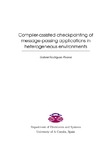Compiler assisted chekpointing of message-passing applications in heterogeneous environments

Use este enlace para citar
http://hdl.handle.net/2183/1098Colecciones
- Teses de doutoramento [2232]
Metadatos
Mostrar el registro completo del ítemTítulo
Compiler assisted chekpointing of message-passing applications in heterogeneous environmentsAutor(es)
Directores
González, Patricia (González Gómez)Martín Santamaría, María José
Fecha
2008Centro/Dpto/Entidad
Universidade da Coruña. Departamento de Electrónica e SistemasResumen
[Resumen]
With the evolution of high performance computing towards heterogeneous, massively parallel systems, parallel applications have developed new checkpoint and restart necessities, Whether due to a failure in the execution or to a migration of the processes to different machines, checkpointing tools must be able to operate in heterogeneous environments. However, some of the data manipulated by a parallel application are not truly portable. Examples of these include opaque state (e.g. data structures for communications support) or diversity of interfaces for a single feature (e.g. communications, I/O).
Directly manipulating the underlying ad-hoc representations renders checkpointing tools incapable of working on different environments. Portable checkpointers usually work around portability issues at the cost of transparency: the user must provide information such as what data needs to be stored, where to store it, or where to checkpoint. CPPC (ComPiler for Portable Checkpointing) is a checkpointing tool designed to feature both portability and transparency, while preserving the scalability of the executed applications. It is made up of a library and a compiler. The CPPC library contains routines for variable level checkpointing, using portable code and protocols. The CPPC compiler achieves transparency by relieving the user from time-consuming tasks, such as performing code analyses and adding instrumentation code.
Palabras clave
Programación paralela (Informática)
ISBN
978-84-692-8878-8





